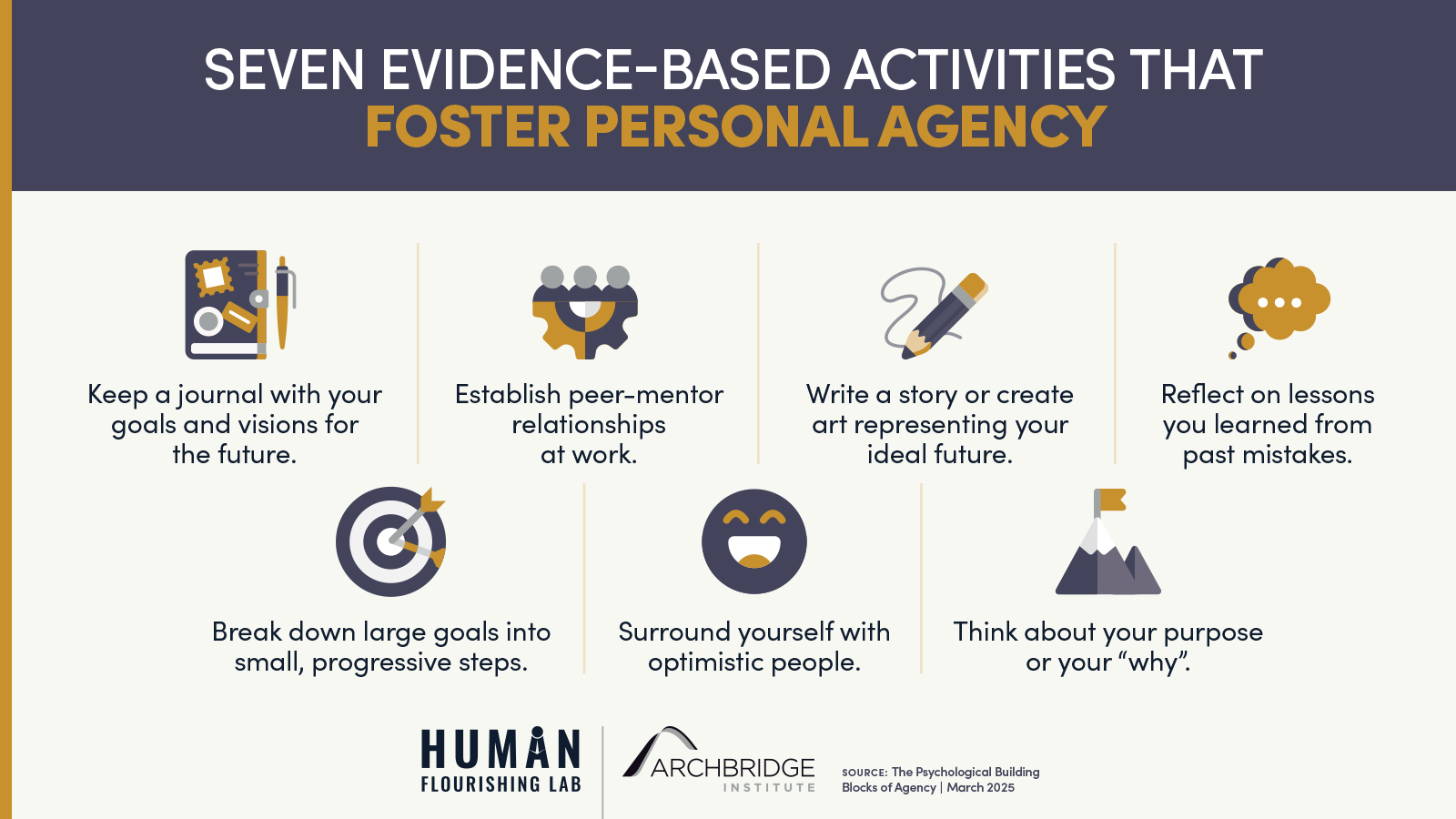WHAT IS PERSONAL AGENCY?
Personal agency refers to people’s beliefs that they can impact the world around them and pursue their own aspirations. Psychologists have developed several theories of personal agency and dedicated decades of research to documenting personal agency’s role in human flourishing.
Some of these approaches view personal agency as a basic psychological need necessary for flourishing. Other perspectives view agency as an intense focus on accomplishing one’s goals critical for achievement and personal progress. More recently, psychologist Martin Seligman proposed a theoretical approach that breaks down personal agency into its essential components. Seligman proposes three interrelated beliefs/attributes that inform people’s global judgment of personal agency: efficacy, optimism, and imagination.
Understanding the components of agency is essential for the science of flourishing. This report reviews research on these three components of agency and their role in human flourishing and suggests recommendations, based on psychological research, for strengthening agency by promoting efficacy, optimism, and imagination.

EFFICACY
Efficacy refers to believing in your ability to complete a goal.
Efficacy Supports Achievement
Efficacy is a central aspect of agency that is crucial for initiating and persisting in goal-related behaviors. Simply put, a person may choose a goal he thinks will benefit him but fail to initiate or persist in the goal because of a lack of confidence in his abilities. Indeed, research indicates that perceptions of agency predict persistence and success in various life domains, such as education, athletics, and the workplace.
Efficacy Supports Adaptive Coping
Efficacy helps people initiate and persist in action because it facilitates coping. Research has shown that high-efficacy people are more resilient; they engage in more healthful coping strategies to manage everyday, chronic, and traumatic stress.
How Can We Promote Efficacy?
Research has supported four ways to promote efficacy. Intervention can make use of one or more strategies to promote efficacy:
- Efficacy can be strengthened via mastery experience. Researchers have developed and tested formal interventions to put people in situations where small successes build the efficacy needed for larger, more continuous success.
- Efficacy can be strengthened via positive emotional appraisals. People who lack efficacy interpret nervousness as fear and, therefore, may disengage from goals. Even without success, research indicates that people can be taught more positive ways of interpreting their feelings so their nervousness becomes a source of inspiration to act rather than a cue to retreat.
- Efficacy can be strengthened via vicarious experiences. Research on large-scale media campaigns and math education programs suggests that when individuals see people like themselves succeeding, they feel more confident in their own ability to succeed and, in turn, more motivated to engage in goal-related action.
- Efficacy can be strengthened via verbal persuasion. Research indicates that feedback on goal progress and verbal encouragement from self and others can strengthen efficacy.
OPTIMISM
Optimism is expecting desirable outcomes to happen and believing you will avoid negative outcomes.
Optimism Promotes Goal Persistence
People commit to goals when they sense they are possible and continue when they expect good things from their actions. Research on college students, aspiring lawyers, and residents of public housing projects finds that optimistic people are better able to pursue and persist in meaningful goals of achievement and growth despite challenges.
Optimism Promotes Productive Coping
Optimists persist in their goals because they use effective strategies to manage stress and are less likely to adopt unproductive tactics. Research indicates that optimists engage in active coping strategies, such as looking to resolve the source of stress and reaching out to others for instrumental or emotional support, rather than using avoidant coping strategies like using substances or other distractions to avoid stress and challenges.
Optimism Helps People Disengage from Unproductive Goals and Accept Uncontrollable Challenges
Finally, optimism contributes to flourishing by helping people disengage from unproductive goals and accept unfavorable outcomes beyond their control. Research indicates that optimistic people are better able to recognize when their efforts are futile and switch their focus to more productive goals. Research also indicates that optimistic people facing serious and unavoidable challenges, such as a terminal diagnosis, are better able to accept and make the best of a bad situation.
Promoting Optimism
Compared to efficacy, which is domain-specific and based on experience, optimism is assumed to be a relatively stable belief that is built over time through experience. Nonetheless, research suggests it is possible to develop a more optimistic view of the future by learning to identify pessimistic thoughts and interpretations and practicing engaging in more optimistic thinking and explanatory styles. Over time, this optimistic thinking style can become habitual and automatic.
IMAGINATION
Imagination involves visualizing hypothetical situations beyond the present circumstances.
Prospection
Prospection is the mental process of imagining possible futures. Research indicates that imagining a desired future is emotionally rewarding and sparks motivation for growth and achievement. Prospection also helps sustain motivation by reminding people that their actions and pursuits are valuable and important to help them avoid the temptation of immediate gratification in favor of continued action toward long-term, satisfying goals. Moreover, imagining a positive future also motivates people to persist and embark on challenging goals by allowing them to anticipate obstacles and plan creative solutions.
Mentalizing
Mentalizing describes imagining other people’s thoughts, feelings, attitudes, intentions, and goals. Mentalizing supports agency and flourishing by helping people maintain supportive and fulfilling social relationships and work effectively in groups to achieve their goals. Mentalization also facilitates learning and innovation. People learn by imitating others and understanding their thought processes and intentions and can innovate when they understand a person’s plan of action enough to come up with a new plan that accomplishes the same goal more effectively or efficiently.
Counterfactual Thinking
Counterfactual thinking involves imagining things that could have happened “if only” things were different than reality. Research suggests that counterfactual thinking plays a role in goal flourishing by allowing people to anticipate what actions might lead to goal success and failure. This process appears somewhat automatic and quite broad. Finally, research suggests that counterfactual thinking helps people avoid unnecessary blame that may damage their self-esteem and learn from their mistakes to plan alternate strategies for accomplishing goals and improving their performance.
Remembering, Imagination’s Close Relative
Neuroscientific and cognitive research indicates that episodic memory and imagination are closely related processes, sharing many of the same brain networks. Therefore, it should not be surprising that remembering can inspire people to pursue and persist in important life goals. Specifically, research on personal nostalgia, which involves mentally revisiting personally meaningful events, has shown that personal nostalgia encourages future action by promoting well-being and serving as a potent reminder of one’s strengths, the meaning/purpose of one’s life, and that one is connected with and supported by one’s friends and family. Remembering provides comfort, strength, and confidence to flourish.
Promoting Imagination
Promoting imagination is not so much encouraging a positive belief as it is with efficacy and optimism; instead, promoting imagination involves getting people to engage in imagination more.
Interventions have been developed to encourage people to engage in positive prospection so they can reap the well-being and motivational benefits of positive prospection more regularly. For example, Future Directed Therapy (FDT) is an effective clinical intervention for depression that looks to direct people’s focus on the future and what they can do to realize a positive future by setting goals, planning strategies, problem-solving, and engaging in constructive counterfactual thinking. Other interventions to encourage imagination involve visualization exercises to map goal pathways and strategies and how future actions can help people achieve a sense of meaning/purpose in life.
BRINGING IT ALL TOGETHER
People feel empowered to pursue their aspirations, overcome challenges, and reach success when they feel capable of accomplishing their goals, believe that they can expect positive things, and can imagine realizing goals and achievements well into the future.
Understanding the recipe for personal agency helps identify strategies to strengthen it. Efficacy, optimism, and imagination are interconnected components of agency. Thus, impacting one component strengthens another. People can use the strategies from this report to promote efficacy, optimism, and imagination and in turn strengthen personal agency, a critical aspect of human flourishing.


A project of the Archbridge Institute
The Archbridge Institute is a non-partisan, independent, 501(c)(3) public policy think tank. Our mission is to lift barriers to human flourishing.
Sign Up For Our Newsletter
Contact
Archbridge Institute
1633 Connecticut Ave. NW, Suite 300,
Washington, DC 20009

